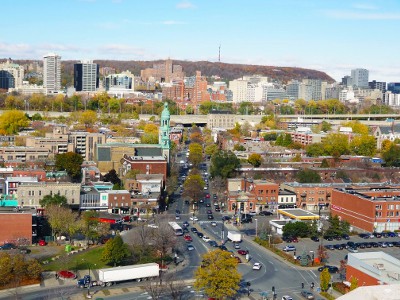Montreal partners with Waze in attempt to ease traffic woes

 Crowd-sourced traffic and navigation app Waze has signed an agreement with the City of Montreal to implement a two-year pilot project for improving traffic outcomes through the sharing of publicly available traffic information in the city’s downtown Ville-Marie borough.
Crowd-sourced traffic and navigation app Waze has signed an agreement with the City of Montreal to implement a two-year pilot project for improving traffic outcomes through the sharing of publicly available traffic information in the city’s downtown Ville-Marie borough.
“We are excited to welcome Montréal as our first partner in Canada,” said Paige Fitzgerald, Connected Citizens Program Manager at Waze. “Waze is only as strong as the information it receives from its users. Montréal is a growing community for Waze and the immense data Montréal can contribute to the Waze app makes them a valued partner moving forward.”
Waze, which is owned by Google, Inc., will provide the City of Montreal with real-time, anonymous incident and slow-down information provided by people who use the app.
“As part of this innovative partnership, the participatory information of Waze users will help to fuel the city’s Centre de gestion de la mobilité urbaine de Montréal (CGMU). By obtaining real-time data, the city wants to improve its reactivity to traffic jams, accidents or other incidents on the road and minimize the impact on drivers. Montréal is the first city in Canada to use Waze data, and if the project is conclusive, we plan to extend its deployment across the city,” said member of the city’s executive committee in charge of transportation Aref Salem.
In return, the CGMU will make available its planned traffic obstruction data through the app, which is already publicly available.
“This year, there will be a number of major construction projects in Ville-Marie. This pilot project is a concrete illustration of initiatives to facilitate road travel for users when there are obstructions to traffic,” said Lionel Perez, in charge of infrastructure for the City of Montreal.
Waze already has more than 103,000 monthly active users in Montreal who provide the app with information pertaining to the 19 million kilometres they travel on the city’s roadways, all of which is transmitted in real time to other Waze users.
Between them, Waze users reported approximately 250,000 incidents in the month of December alone, helping each user plan their route through the city.
According to a Radio-Canada report, the City of Montreal has also been running a pilot project using 32 nondescript brown boxes developed by traffic circulation technology company Orange Traffic, which use Bluetooth to anonymously capture cell phone signals from passing motorists, letting the city know where, how far and how fast motorists are traveling.
“Collecting mobility data is part of our Montréal, Smart and Digital City Action Plan,” said vice-chair of the city’s executive committee and member in charge of smart city initiatives Harout Chitilian. “A smart city knows how to take advantage of the expertise of dynamic companies in the field of new technologies to improve service to its residents. In addition to the benefits it offers users of Montréal’s roads, the partnership with Waze helps to position Montréal as a national and international leader among smart cities.”
Just three years ago, Montreal seemed an unlikely candidate in the emerging category of “smart cities”, but just a year shy of the 50th anniversary of Expo ’67 and the city’s 375th birthday, a cohesive strategy for formulating outcomes is becoming clearer.
Montreal is currently one seven finalists, among three Canadian cities including Surrey, B.C. and Winnipeg, on the Intelligent Community Forum’s 2016 shortlist, the ultimate winner of which will be announced in Columbus, Ohio this June.

Terry Dawes
Writer
